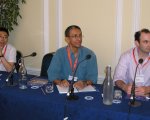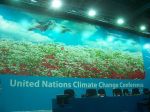A hard act to follow.

Nadia el-Awady (centre), with the new board of the World Federation of Science Journalists, will welcome science writers to Cairo in 2011
That’s been the verdict on each of the last two world conferences of science journalists, held in Montreal and Melbourne in 2004 and 2007 respectively. And it was the same at the close of the London meeting, widely acclaimed to be the biggest and best so far.
With over 900 delegates – 200 more than in Melbourne – and a tightly packed, broad-ranging programme, many of whose highlights we have captured in this blog, the 6th World Conference of Science Journalists yet again underlined both the vitality of the profession, and its growing importance in acting as both a channel of communication between science and society, as well as a watchdog on the way that the relationship between the two develops.
One difference from the earlier meetings was the increased feeling of gloom about the prospects for traditional science journalism, particularly in the developed world. But there was plenty to celebrate elsewhere. It has been especially rewarding to watch the growth of science journalism in developing countries, and awareness of the profession’s role in meeting the challenges of development.
The meeting was not without its faults. The higher-than-anticipated number of delegates meant that many of the meetings took place in overcrowded rooms with frustrated — and often over-heated — delegates left outside in the corridors.
A significant amount of the debate remained at a somewhat superficial level. Science journalists – like many other professions – are much better at self-reflection than at self-criticism. A few more external voices from those who have carried out analytical studies of their work, not always complimentary, would have spiced up the proceedings.
Finally, as one of our blog entries below highlights, there is still some way to go in ensuring that the programme adequately reflects the global ambitions of the conference organisers. Despite gallant efforts to achieve this, much of the agenda remained dominated by northern participants and perspectives.
The next meeting, due to take place in Cairo in 2011, will be an excellent opportunity to correct these various faults (as well as other suggestions for improvement that the organisers say they would be delighted to receive). And there is every reason to believe that once again it will be a hard act to follow.
Cairo, here we come.
David Dickson, SciDev.Net



 Posted by scidevnet
Posted by scidevnet 
 Will we ever have an AIDS vaccine? After numerous failed trials — including 2007’s infamous Merck trials — you could be forgiven for wondering whether HIV, the most complex human virus, is just too smart for us, with its constant, rapid mutation and ability to hide parts of itself from the immune system.
Will we ever have an AIDS vaccine? After numerous failed trials — including 2007’s infamous Merck trials — you could be forgiven for wondering whether HIV, the most complex human virus, is just too smart for us, with its constant, rapid mutation and ability to hide parts of itself from the immune system.










You must be logged in to post a comment.